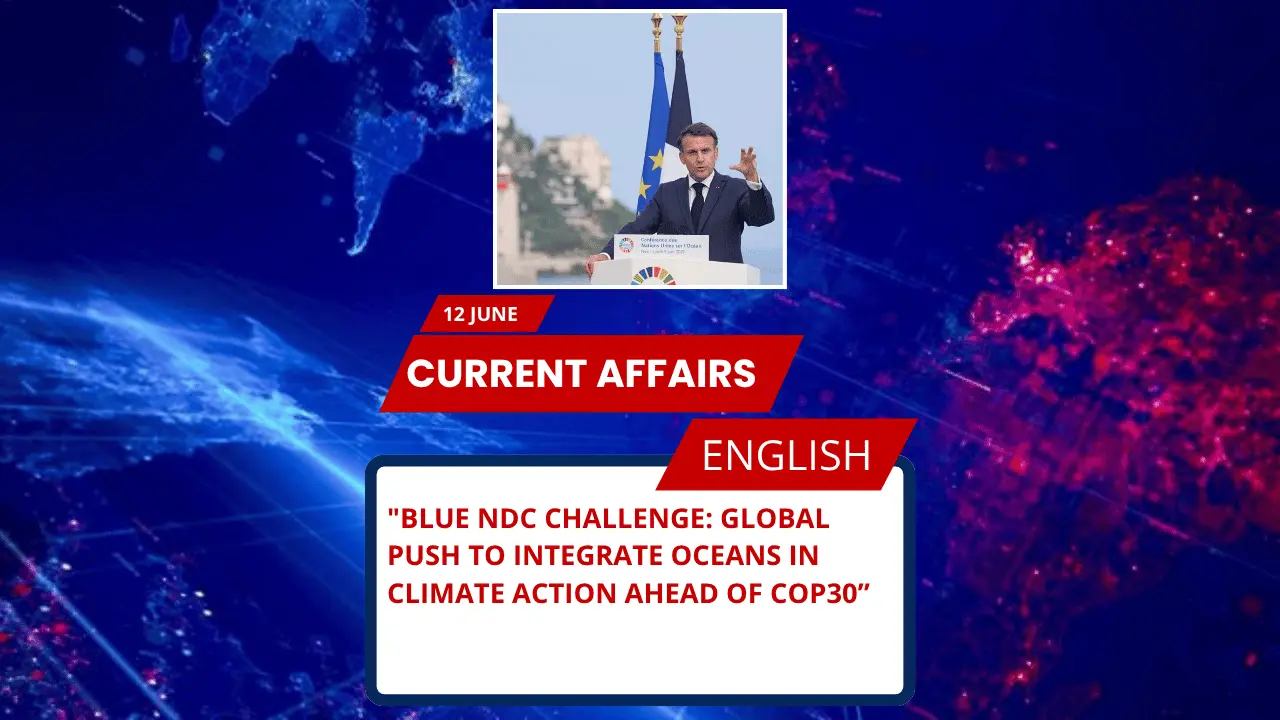
Key Points for SSC, UPSC & Other Govt Exams
- The Blue Nationally Determined Contributions (NDC) Challenge was launched by France and Brazil.
- Announced at the Third UN Ocean Conference (UNOC3).
- Aims to include ocean-focused climate actions in national climate commitments.
- Countries joined: Australia, Fiji, Kenya, Mexico, Palau, Seychelles.
- Backed by: Ocean Conservancy, World Resources Institute (WRI), Ocean and Climate Platform, and WWF-Brazil.
- Targets COP30, to be held in Belem, Brazil.
- Part of the commitments under the Paris Agreement (UNFCCC COP21).
- Connected to the concept of the Blue Economy.
Detailed Overview of the Blue NDC Challenge
What is the Blue NDC Challenge?
The Blue Nationally Determined Contributions Challenge is a pioneering global climate initiative launched jointly by France and Brazil at the Third UN Ocean Conference (UNOC3). This initiative urges countries to integrate ocean-related climate actions into their NDCs (Nationally Determined Contributions) ahead of COP30, which will be held in Belem, Brazil.
Why This Matters?
Oceans are essential to global climate regulation. Despite this, their role has been largely underrepresented in national climate policies. The Blue NDC Challenge aims to correct this by:
- Encouraging nations to factor in ocean conservation, marine ecosystem resilience, and blue carbon solutions in their national climate commitments.
- Promoting global collaboration to address climate change’s oceanic impacts like acidification, coral bleaching, and sea level rise.
Who Supports This Initiative?
The initiative has received global institutional support, including:
- Ocean Conservancy
- Ocean and Climate Platform
- World Resources Institute (WRI) through ORCA (Ocean Resilience and Climate Alliance)
- WWF-Brazil
Countries Participating
Along with France and Brazil, six other nations have joined the Blue NDC Challenge:
- Australia
- Fiji
- Kenya
- Mexico
- Palau
- Seychelles
These countries represent diverse geographies, indicating wide international support for integrating marine priorities into climate frameworks.
About Key Organizations, Countries & Events
1. United Nations Framework Convention on Climate Change (UNFCCC)
- Established: 1992 (Rio Earth Summit)
- Goal: Stabilize greenhouse gas levels to prevent harmful climate interference.
- Important Event: COP21, Paris (2015) – Led to the Paris Agreement.
2. COP30 (Conference of Parties)
- Event Year: 2025
- Host: Brazil, City: Belem
- Focus: Reviewing and updating global climate commitments, particularly NDCs.
3. Brazil
- Capital: Brasília
- President: Luiz Inácio Lula da Silva (as of 2025)
- Major Biome: Amazon Rainforest
- Significance: Hosts COP30, co-leads Blue NDC.
4. France
- Capital: Paris
- President: Emmanuel Macron (as of 2025)
- Significance: Host of COP21, origin of the Paris Agreement.
5. World Resources Institute (WRI)
- Type: Global research non-profit
- Headquarters: Washington D.C., USA
- Focus: Environmental sustainability, economic opportunity
What are Nationally Determined Contributions (NDCs)?
NDCs are national climate plans that outline a country’s efforts to reduce greenhouse gas emissions and adapt to climate change. These are a core element of the Paris Agreement, adopted at COP21 in 2015.
NDCs aim to:
- Keep global average temperature rise well below 2°C
- Pursue efforts to limit warming to 1.5°C
What is the Blue Economy?
The Blue Economy refers to the sustainable use of ocean resources for economic growth, improved livelihoods, and job creation, while also preserving ocean health.
Examples include:
- Marine renewable energy
- Sustainable fisheries
- Eco-tourism
- Marine biotechnology
Possible Exam MCQs
Q1. Which two countries launched the Blue Nationally Determined Contributions Challenge?
A. USA and Canada
B. France and Brazil
C. India and Brazil
D. UK and Australia
Answer: B. France and Brazil
Q2. What is the main focus of the Blue NDC Challenge?
A. Forest Conservation
B. Air Pollution Reduction
C. Ocean-based Climate Action
D. Carbon Tax Reform
Answer: C. Ocean-based Climate Action
Q3. COP30 will be held in which city and country?
A. Paris, France
B. Nairobi, Kenya
C. Belem, Brazil
D. Suva, Fiji
Answer: C. Belem, Brazil
Q4. What is the objective of NDCs under the Paris Agreement?
A. Limit global temperature rise to below 4°C
B. Eliminate carbon emissions by 2030
C. Stabilize GHG levels and reduce warming below 2°C
D. Promote biodiversity in deserts
Answer: C. Stabilize GHG levels and reduce warming below 2°C
UPSC-Style FAQs with Model Answers
Q1. What is the Blue NDC Challenge and how does it align with the objectives of the Paris Agreement?
Answer :
The Blue Nationally Determined Contributions (NDC) Challenge is a global initiative launched by France and Brazil to integrate ocean-related climate measures into countries’ national climate action plans. This aligns directly with the Paris Agreement’s goals of limiting global warming to well below 2°C, preferably 1.5°C, as oceans play a critical role in climate regulation, carbon storage, and ecosystem stability. By encouraging nations to include marine protection and blue carbon solutions in their NDCs, the initiative enhances the comprehensiveness of global climate responses, ensuring marine ecosystems are not neglected in national and international policy frameworks.
Q2. Discuss the significance of ocean-based solutions in achieving global climate goals. Illustrate with examples.
Answer :
Oceans regulate over 90% of global heat and are vital carbon sinks, yet they remain underrepresented in climate strategies. Ocean-based solutions like marine protected areas, mangrove restoration (blue carbon), and sustainable fisheries contribute both to climate mitigation and resilience. The Blue NDC Challenge recognizes this and encourages their inclusion in national policies. For example, mangroves sequester 4x more carbon than terrestrial forests. Implementing such measures through NDCs ensures a more integrated and effective approach to combat climate change, making the Paris Agreement’s temperature goals more achievable.
Conclusion
The Blue NDC Challenge is not just a climate policy update—it’s a transformative step towards holistic climate governance. With oceans covering more than 70% of the Earth’s surface, protecting them through structured national efforts is no longer optional—it is essential. For aspirants of SSC, UPSC, and other exams, this initiative provides a timely case study in international cooperation, environmental policy, and global governance.







